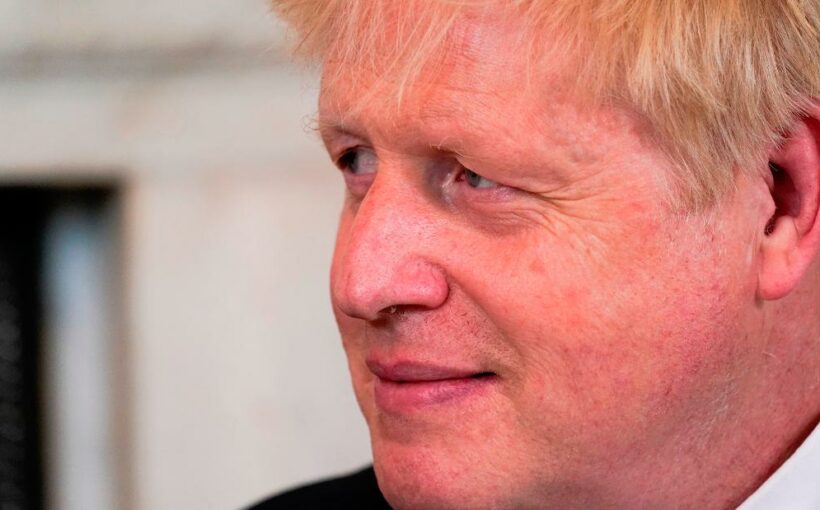London (CNN Business)Investors don’t usually like political uncertainty. But in the United Kingdom, a shake-up in government could be exactly what the economy needs.
British Prime Minister Boris Johnson will face a vote of confidence on Monday triggered by lawmakers in his own party. They’re angered by government parties that broke coronavirus rules, his handling of a deteriorating cost-of-living crisis and a dearth of clear policy goals.
If 180 Conservative Party lawmakers — or a simple majority — vote against Johnson, he will cease to be leader of the governing party and will be removed from office, less than three years after scoring a landslide win in a general election. If Johnson wins the vote, he will remain leader of the party and prime minister, although with his authority damaged.
Markets could initially be rattled if Johnson loses, given the instability and jockeying to replace him that would follow. But some analysts believe it could ultimately be a positive development for UK investments, since it would clear the way for someone with a bolder vision to take the reins as economic activity stalls.
The world’s fifth-biggest economy ground to a halt in February and started shrinking in March. The British pound has plunged almost 8% against the US dollar this year, losing even more than the euro.
“It really does open up the possibility of change,” said Jordan Rochester, a currency analyst at Nomura who specializes in the UK market. The current government, he added, “is lacking an agenda, apart from ‘keep Boris Johnson in power.'”
Britain’s bad run
Around the world, countries are facing huge economic challenges, as the lingering effects of the pandemic, Russia’s invasion of Ukraine and soaring inflation drag down once-robust recoveries. But the United Kingdom is in a particularly bad spot.
The knock-on effects of Brexit have led to crippling labor shortages and boosted operating costs for businesses, making the spike in prices even worse.
Inflation in the United Kingdom reached 7.8% in the 12 months to April, compared with 7.4% in the European Union during the same period. It’s expected to peak above 10% later this year, a higher rate than the United States.
The rise in food and fuel prices has created the worst cost-of-living crisis in decades, forcing lower-income households to choose between “heating and eating,” which has become a rallying cry as campaigners demand more government support.
Johnson’s government has said it will provide £400 ($502) in grants to help out the millions of people struggling to pay their energy bills. It also bowed to pressure last month and unveiled a £5 billion ($6.3 billion) tax on the windfall profits of oil and gas companies.
But his premiership has been shaken by the “Partygate” scandal, with months of allegations of parties and gatherings at the heart of his government during various stages of pandemic lockdown eroding confidence in his leadership. A damning report by senior civil servant Sue Gray, published late last month, found a culture of partying and socializing among Johnson’s staff while millions of Britons were banned from seeing their friends and relatives.
His style of governance has also animated critics as the country’s economy stumbles.
“You are simply seeking to campaign, to keep changing the subject and to create political and cultural dividing lines mainly for your advantage, at a time when the economy is struggling, inflation is soaring and growth is anemic at best,” Conservative Party lawmaker Jesse Norman — a former Treasury minister — said in a letter Monday explaining why Johnson had lost his support.
A new prime minister?
The possibility of a new leader in No. 10 Downing Street is generating buzz among investors, since it could give the government new direction.
The market delighted in Johnson at first. His election in 2019, on the back of his commitment to “get Brexit done,” provided a clear path forward in the wake of a prolonged period of limbo following the 2016 vote to leave the European Union.
His victory sent the pound to $1.34. While it was battered by the pandemic, a strong recovery in 2021 pushed it above $1.40 a year ago.
But the economy’s troubling downturn — coupled with the US dollar’s sharp rally — has caused problems since then. The currency has plummeted back below $1.26.
A new prime minister could unveil a big spending package to win support, usher in more dramatic reforms and dial down brinkmanship with the European Union over trade, Rochester said. That would be helpful for sterling.
“While the uncertainty of who could run the country may temporarily hurt market sentiment, the economy and markets would likely benefit if the UK is no longer led by an unpredictable populist,” Kallum Pickering, senior economist at Berenberg Bank, said in a note to clients on Monday.
If Johnson wins, meanwhile, the United Kingdom can expect more of the same, according to Pickering.
“Johnson would continue to preside over a low wattage mostly-centrist agenda,” he said.
The margins of Monday’s vote will matter for Johnson’s political future. Former Prime Minister Theresa May resigned less than six months after surviving a confidence vote in late 2018.
Source: Read Full Article

